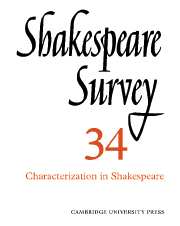Book contents
- Frontmatter
- Shakespeare’s Open Secret
- The Emergence of Character Criticism, 1774–1800
- Society and the Individual in Shakespeare’s Conception of Character
- Realistic Convention and Conventional Realism in Shakespeare
- On Expectation and Surprise: Shakespeare’s Construction of Character
- Shakespeare and the Ventriloquists
- The Rhetoric of Character Construction: Othello
- Characterizing Coriolanus
- The Ironic Reading of The Rape of Lucrece and the Problem of External Evidence
- The Unity of Romeo and Juliet
- No Abuse: The Prince and Falstaff in the Tavern Scenes of Henry IV
- Twelfth Night: The Experience of the Audience
- Plays and Playing in Twelfth Night
- Sceptical Visions: Shakespeare’s Tragedies and Jonson’s Comedies
- Shakespeare in Performance, 1980
- The Year's Contributions to Shakespearian Study 1 Critical Studies
- 2 Shakespeare’s Life, Times and Stage
- 3 Textual Studies
- Index
- Plate Section
Society and the Individual in Shakespeare’s Conception of Character
Published online by Cambridge University Press: 28 March 2007
- Frontmatter
- Shakespeare’s Open Secret
- The Emergence of Character Criticism, 1774–1800
- Society and the Individual in Shakespeare’s Conception of Character
- Realistic Convention and Conventional Realism in Shakespeare
- On Expectation and Surprise: Shakespeare’s Construction of Character
- Shakespeare and the Ventriloquists
- The Rhetoric of Character Construction: Othello
- Characterizing Coriolanus
- The Ironic Reading of The Rape of Lucrece and the Problem of External Evidence
- The Unity of Romeo and Juliet
- No Abuse: The Prince and Falstaff in the Tavern Scenes of Henry IV
- Twelfth Night: The Experience of the Audience
- Plays and Playing in Twelfth Night
- Sceptical Visions: Shakespeare’s Tragedies and Jonson’s Comedies
- Shakespeare in Performance, 1980
- The Year's Contributions to Shakespearian Study 1 Critical Studies
- 2 Shakespeare’s Life, Times and Stage
- 3 Textual Studies
- Index
- Plate Section
Summary
The social dimension in Shakespeare’s conception of character suggests itself perhaps most strikingly when Ulysses, in pursuing his well-devised strategy of ‘strangeness’ and ‘pride’ towards Achilles, is made to remark
That no man is the lord of anything,
Though in and of him there be much consisting,
Till he communicate his parts to others.
(Troilus and Cressida, 3.3.115–17)The weight of the passage, over and beyond the immediate scheme of the Greek general, is underlined by Ulysses himself in his earlier reference to that 'strange fellow' who
Writes me that man - how dearly ever parted,
How much in having, or without or in -
Cannot make boast to have that which he hath,
Nor feels not what he owes, but by reflection;
As when his virtues shining upon others
Heat them, and they retort that heat again
To the first giver.
(ll. 96-102)- Type
- Chapter
- Information
- Shakespeare Survey , pp. 23 - 32Publisher: Cambridge University PressPrint publication year: 1982
- 3
- Cited by

